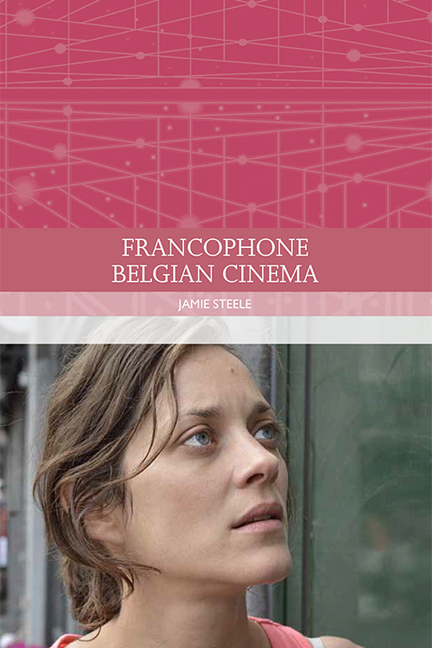Book contents
- Frontmatter
- Contents
- List of Figures
- Acknowledgements
- Traditions in World Cinema
- Introduction: Regional/National/Transnational Debates in Francophone Belgian Cinema
- 1 The (Francophone) Belgian Film Ecosystem: Trends in Production, Distribution and Exhibition
- 2 ‘No Future’: Social Marginalisation, Social Precariousness and Depictions of Seraing in Le gamin au vélo (Jean-Pierre and Luc Dardenne, 2011) and Deux jours, une nuit (Jean-Pierre and Luc Dardenne, 2014)
- 3 ‘Stills’ and Fragmented Families: Contemplating the Private Sphere in Joachim Lafosse’s Wallonia
- 4 From Slag Heaps to Cliffs: The ‘Marked’ Regional Landscape in Cages (Olivier Masset-Depasse, 2006)
- 5 The Francophone Belgian Road Movie: Eldorado (Bouli Lanners, 2008) and Ultranova (Bouli Lanners, 2005)
- 6 Lucas Belvaux’s Return: The Thriller Genre and Heists in Liège
- Conclusion
- Works Cited
- Films Cited
- Index
3 - ‘Stills’ and Fragmented Families: Contemplating the Private Sphere in Joachim Lafosse’s Wallonia
Published online by Cambridge University Press: 29 April 2021
- Frontmatter
- Contents
- List of Figures
- Acknowledgements
- Traditions in World Cinema
- Introduction: Regional/National/Transnational Debates in Francophone Belgian Cinema
- 1 The (Francophone) Belgian Film Ecosystem: Trends in Production, Distribution and Exhibition
- 2 ‘No Future’: Social Marginalisation, Social Precariousness and Depictions of Seraing in Le gamin au vélo (Jean-Pierre and Luc Dardenne, 2011) and Deux jours, une nuit (Jean-Pierre and Luc Dardenne, 2014)
- 3 ‘Stills’ and Fragmented Families: Contemplating the Private Sphere in Joachim Lafosse’s Wallonia
- 4 From Slag Heaps to Cliffs: The ‘Marked’ Regional Landscape in Cages (Olivier Masset-Depasse, 2006)
- 5 The Francophone Belgian Road Movie: Eldorado (Bouli Lanners, 2008) and Ultranova (Bouli Lanners, 2005)
- 6 Lucas Belvaux’s Return: The Thriller Genre and Heists in Liège
- Conclusion
- Works Cited
- Films Cited
- Index
Summary
Since the nascent stages of Joachim Lafosse's career, the filmmaker has received critical valorisation of his work, traced back to his graduation film, Tribu (Joachim Lafosse, 2001). The short film was awarded the President of the Jury prize by Wim Wenders at the Munich film festival, and it received a special mention at Locarno (Lorfèvre 2006a: 17). The 2004 Locarno film festival proved a crucial barometer for the valorisation of his films – alongside fellow francophone Belgian filmmaker Olivier Masset-Depasse – in which Folie privée/Private Madness (Joachim Lafosse, 2004) was selected for international competition. The short cohered with low-budget filmmaking for which (francophone) Belgian cinema had established its international and national reputation, with the cult film C’est arrivé près de chez vous/Man Bites Dog (Rémy Belvaux, André Bonzel and Benoît Poelvoorde, 1992), due to the limited finance and production resources available in the 1990s and early 2000s. As Lorfèvre (2004) notes, the ‘autoproduction’ label – attached to films financed primarily outside the funding systems – was used as a means of categorising a group of low-budget films produced in Belgium at the time, such as the Dogme 95 film Strass (Vincent Lannoo, 2001), Ordinary Man (Vincent Lannoo, 2005) and Last Night on Earth (Giles Daoust, 2004).
The production context for Lafosse's films has discernibly differentiated as his filmmaking career has progressed. His first two feature-length films Folie privée and Ça rend heureux (Joachim Lafosse, 2006) were produced through primarily community-based and ‘national’ funding networks. A shift occurred with Nue propriété/Private Property (2006), his third feature film, which drew heavily on funding from France. After producing Folie privée, Lafosse was selected and invited to attend the Cinéfondation workshops run by the Cannes film festival to enable novice, emerging filmmakers to meet industry professionals (Schwartz 2007). However, difficulties in obtaining funding for Nue propriété led to Lafosse creating Ça rend heureux, which served as ‘a refusal to wait for the good will of [film] funders’ (Lafosse, in Lorfèvre 2005). As noted in Chapter One, these international co-productions, primarily with France, cohere with funding patterns established between francophone Belgian filmmakers and France even prior to the creation of European funding support mechanisms in the early 1990s. However, the funding of Nue propriété arrived alongside the inclusion of a French star, Isabelle Huppert, in the role of the mother.
- Type
- Chapter
- Information
- Francophone Belgian Cinema , pp. 82 - 104Publisher: Edinburgh University PressPrint publication year: 2018



